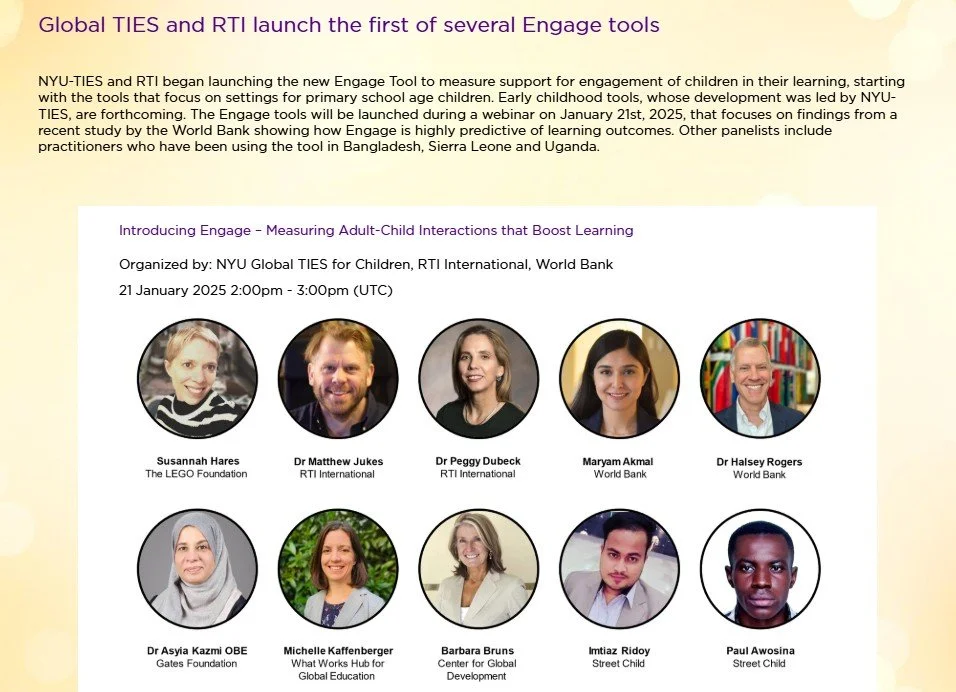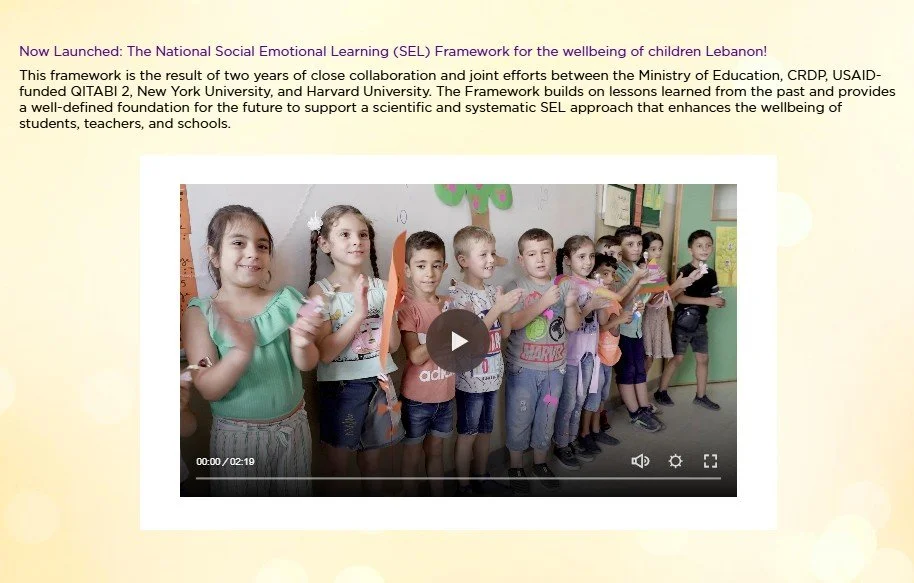Resources
Global TIES and RTI launch the first of several Engage tools
NYU-TIES and RTI began launching the new Engage Tool to measure support for engagement of children in their learning, starting with the tools that focus on settings for primary school age children. Early childhood tools, whose development was led by NYU-TIES, are forthcoming. The Engage tools will be launched during a webinar on January 21st, 2025, that focuses on findings from a recent study by the World Bank showing how Engage is highly predictive of learning outcomes. Other panelists include practitioners who have been using the tool in Bangladesh, Sierra Leone and Uganda.
Gobee learning agenda: Our top six learnings from developing an edtech tool for emergency settings
Gobee, a prototype assessment tool for emergency settings, set out to make it easier for teachers and facilitators to measure children’s learning progress. Following the initial stages of development, War Child and NYU Global TIES share their learnings and publish the codes on an open-source platform.
Evaluating Program Enhancement Strategies for Remedial Tutoring: A Cluster-Randomized Control Trial With Syrian Refugee Students in Lebanon
Despite widespread enthusiasm for remedial education programming with refugee populations, there is little rigorous evidence on how to design and implement such programs. We employ a cluster-randomized design of non-equivalent treatment groups to test the impact of access to two types of program enhancement: longer program duration and the addition of skilltargeted social and emotional learning (SEL) activities for Syrian refugees enrolled in Lebanese public schools. We find that, compared to 10 weeks of programming, 26 weeks marginally increases students’ literacy skills (ES = 0.04) and significantly improves behavioral regulation (ES = 0.31), but students reported less positive perceptions of their public school environment (ES= −0.83 to −0.89) and remedial tutoring site (ES= −0.15 to −0.24). We also find that the addition of skill-targeted SEL activities to 26 weeks of programming results in higher student reports of school-related stress compared to programming without skill-targeted activities (ES = 0.21). Implications for program and policy are discussed.
Lessons and Impacts of Ahlan Simsim TV Program in Pre-Primary Classrooms in Jordan on Children’s Emotional Development: A Randomized Controlled Trial
In this brief, Global TIES researchers evaluate the effects of Ahlan Simsim, a television show co-produced by Sesame Workshop and Jordan Pioneers that has been viewed by more than 23 million children across the MENA region, including 57% of displaced Syrians across Jordan, Lebanon, and Iraq.
Lessons and Impacts of a Phone-Based Parenting Program for Syrian and Jordanian Families with Young Children
In this brief, Global TIES researchers evaluate a phone-delivered version of a parenting program in the Middle East and the first randomized-controlled evaluation of an audio-only parenting program.
دروس وآثار برنامج تربوي للآباء والأمهات عبر الهاتف تقييم فاعلية برنامج تربوي لتنمية الطفولة المبكرة قائم عبر الهاتف:دراسة من الأردن السورية والأردنية للأطفال الصغار
الوصف: في هذا الملخص، قام باحثو مركز جلوبال تايز (Global TIES) بتقييم برنامج تربوي قائم عبر الهاتف لتنمية الطفولة المبكرة في الشرق الأوسط، وهو أول تقييم عشوائي محكم لمثل هذه البرامج في المنطقة. على الرغم من أهمية هذه البرامج خاصة في سياقات الأزمات والظروف الإنسانية التي تعرقل تنفيذ البرامج حضورياً إلا أن المعلومات حول آثار برامج تنمية الطفولة المبكرة المقدمة عن بُعد تعتبر قليلة. في عام 2020، قامت اللجنة الدولية للإغاثة بتكييف برنامج التربية الذي يتم تقديمه حضوريًا على شكل زيارات منزلية ليتم تقديمه عن بُعد عبر مكالمات هاتفية صوتية فقط، مما أتاح فرصة فريدة لتقييم برنامج تربوي مقدم عن بعد. البرنامج الحضوري الأصلي الذي تم تعديله يُدعى "Reach up and Learn-RUL" وقد قدمته اللجنة الدولية للإغاثة من عام 2016 حتى بداية عام 2020 في أجزاء من الأردن، واستهدف كلًا من المربين الأردنيين والسوريين. تم إجراء التعديلات لتقديمه عن بُعد كاستجابة للجائحة وكجزء من مبادرة "أهلاً سمسم" بالتعاون مع "ورشة سمسم".
تقييم فاعلية برنامج "أهلًا سمسم" على التطور العاطفي لدى الأطفال في المرحلة التمهيدية: تجربة عشوائية محكّمة من الأردن
الوصف: في هذا الملخص، يعرض الباحثون في مركز جلوبال تايز (Global TIES) نتائج تقيّم أثر برنامج أهلًا سمسم، وهو برنامج تلفزيوني قامت بإنتاجه ورشة عمل سمسم ومؤسسة جوردن بيونيرز (Jordan Pioneers TV Production)، والذي جذبت حلقاته أنظار أكثر من 23 مليون طفل في منطقة الشرق الأوسط وشمال إفريقيا، بما في ذلك W من النازحين السوريين في الأردن ولبنان والعراق. تعد هذه الدراسة من أولى الدراسات التي من شأنها تقييم الأثر السببي لبرنامج إعلامي 1) تم تصميمه لبلدان الشرق الأوسط المتأثرة بالنزاع السوري وأزمة اللاجئين و 2) يركز على التطور العاطفي لدى الأطفال في المرحلة التمهيدية. وجدت الدراسة تأثيرات إيجابية على الأطفال فيما يتعلق ب: ١) معرفة برنامج أهلا سمسم وشخصياته ٢) التعرّف العاطفي المعبرّ (القدرة على تحديد العواطف المصورة بشكل صحيح) ٣) القدرة على تحديد عواطف الآخرين في سيناريوهات اجتماعية محددة ٤) ذكر استراتيجية التنفس كطريقة إدارة العواطف القوية وهي إحدى استراتيجيات تنظيم العواطف الست التي يركز عليها منهج "أهلًا سمسم".
Strengthening holistic learning outcome measurement systems in emergencies and protracted crises: Colombia and Peru
This concept note describes the frameworks, concepts and methods of the project in which NYU Global TIES for Children (NYU-TIES) and the Universidad de los Andes are working to strengthen holistic learning monitoring and evaluation systems in Colombia and Peru (main recipients of Venezuelan refugee and migrant families).
Now More Than Ever: Strengthening systems for social and emotional skills and well-being assessment during the COVID-19 pandemic in Lebanon and Peru
This document outlines the work done by NYU Global TIES to strengthen social and emotional skills and well-being assessment in Lebanon and Peru during the COVID-19 pandemic. It explains the frameworks and concepts, and outlines next steps in those countries.
Introducing the PLAY toolkit [teaser]
The toolkit measures how caregivers and teachers support children’s engagement in their learning. The toolkit consists of observation and survey tools for children from birth to 12-years-old and can be applied across diverse learning settings and contexts
The Road Paved With Good Intentions: is Social and Emotional Learning (SEL) Safe and Effective for All Children Affected by Crises?
The recent earthquakes in Turkey and Syria hit an already war-torn region and populations in the Middle East. They have left lasting psychological and physical trauma for 8.8 million affected people in Northern Syria alone–a region where 4.1 million people already depend on humanitarian assistance. While immediate emergency responses are essential, once the initial crises pass, children impacted by conflict and crises still need to grow up and learn, coping with painful memories and unpredictable and often hostile environments. They deserve and need support that can help them to navigate the adversities on their own. Unfortunately, the disruptions in the aftermath of crises can exacerbate the emotional and psychological toll on children, affecting their physical and emotional well-being, learning and development over the long term.
Measuring the Dosage of Brief Social-emotional Learning (Sel) Activities in Humanitarian Settings
Key messages for researchers and practitioners:Key messages for researchers and practitioners:
When studying brief and skill-targeted social-emotional learning activities, consider calculating measures of dosage: how much (quantity), how often (repetition pattern), and for how long (duration) the activities are implemented. Examine these measures as potential predictors of program outcomes or moderators of the program impact; and use the information to determine the “optimal dosage” when scaling up.
Link these measures with teachers’ and enumerators’ reports on implementation to provide better guidance on overall implementation quality. Examine these measures as potential predictors of program outcomes or moderators of the program impact; and use the information to determine the “optimal dosage” when scaling up.
Link these measures with teachers’ and enumerators’ reports on implementation to provide better guidance on overall implementation quality."
Thinking outside the classroom: Theories of change and measures to support the design, monitoring, and evaluation of distance learning programs
This report is intended to be a living framework for thinking and talking about distance education interventions, beginning in low- and middle-income (LMIC) and humanitarian contexts and expanding over time to include distance education interventions designed for high-income contexts.
Measuring the dosage of brief and skill-targeted social-emotional learning (SEL) activities in humanitarian settings
In humanitarian settings, social-emotional learning (SEL) programs for children are often delivered using a field-feasible approach where the programs are more easily deployable and adaptable in the field, require minimal training, and depend less on the strict sequence and structure of the program components to elicit the intended treatment effect. However, evidence is lacking on what aspects of this implementation approach enable the SEL programming to be more beneficial to children’s SEL development.
Now Launched: The National Social Emotional Learning (SEL) Framework for the wellbeing of children Lebanon!
This framework is the result of two years of close collaboration and joint efforts between the Ministry of Education, CRDP, USAID-funded QITABI 2, New York University, and Harvard University. The Framework builds on lessons learned from the past and provides a well-defined foundation for the future to support a scientific and systematic SEL approach that enhances the wellbeing of students, teachers, and schools.
Remedial programming and skill-targeted SEL in low-income and crisis-affected contexts: Experimental evidence from Niger
Despite substantial cross-national interest in remedial programming as a way to support low-achieving students, evidence of its effectiveness is rare, particularly in low-income and/or crisis-affected contexts. In this article, we present experimental evidence of the impact of a remedial tutoring program on academic outcomes from a two-level randomized trial of two treatments in Niger: school randomization testing the impact of skill-targeted SEL activities and within-school student-level randomization testing the impact of access to remedial tutoring.
Measuring early learning and development across cultures: Invariance of the IDELA across five countries
Relatively little research has addressed whether conceptual frameworks of early learning generalize across different national contexts. This article reports on a cross-country measurement invariance analysis of the International Development and Early Learning Assessment (IDELA). The IDELA is a direct assessment tool for 3- to 6-year-old children, intended to measure Early Literacy, Early Numeracy, Motor, and Social-Emotional development. Its generalizability is evaluated using samples from 5 countries: Afghanistan (N = 2,629); Bolivia (N = 480); Ethiopia (N = 682); Uganda (N = 504); and Vietnam (N = 675). The 4-domain model of the IDELA was supported in each country, although the domains were highly correlated. Measurement invariance analysis revealed that most IDELA items do not provide a basis for comparing children’s development over the 5 countries. This research supports the use of the IDELA for program evaluation and within-country monitoring purposes, but cautions against its use for international comparisons. (PsycINFO Database Record (c) 2019 APA, all rights reserved)
Self-Regulation Assessment-Assessor Report (SRA-AR) - Niger
The Self-Regulation Assessment-Assessor Report (SRA-AR) is a measurement tool used to capture assessors’ perceptions of of Nigerian refugee and Nigerien children’s skills at regulating their behavior during an assessment. The SRA-AR was developed based on the Preschool Self-Regulation Assessment-Assessor Report (PSRA-AR) (Smith-Donald et al., 2007). The developers tested this measurement tool in Niger.












![Introducing the PLAY toolkit [teaser]](https://images.squarespace-cdn.com/content/v1/5fa0560c3a27c834f6a6b5ac/1680266280744-Q88JNJN0GAHBS4VCLC7Q/Screen%2BShot%2B2023-03-31%2Bat%2B08.37.29.jpg)







